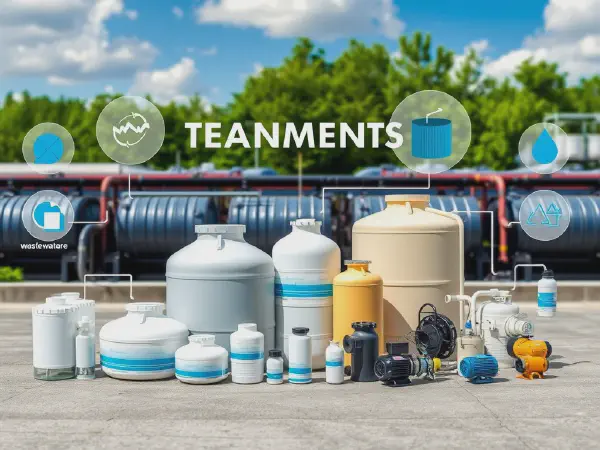Comprehensive Guide to Wastewater Products and Their Uses

The Comprehensive Guide to Wastewater Products
Wastewater products play a crucial role in treating and managing waste substances generated from various activities and ensuring they do not negatively affect the environment and public health. These products include a wide array of chemicals, biological agents, and filtration systems designed to treat and recycle wastewater effectively and efficiently.
As our demand for water continues to increase, the challenge of treating wastewater grows in importance. Wastewater products are essential in mitigating environmental pollution, supporting water recovery, and enabling the safe release of treated water back into natural systems. By using advanced wastewater products, industries, municipalities, and agricultural sectors can adopt more sustainable practices and reduce their ecological footprint.
The variety of wastewater products available in the market allows for tailored solutions for different treatment needs and scenarios. Depending on the source and composition of wastewater, specific products may be used for chemical treatment, biological treatment, filtration, and sustainable management. Understanding the different types and applications of these products allows organizations to make informed decisions regarding their wastewater treatment strategies.
The efficiency of modern treatment facilities often hinges on the quality of Wastewater products utilized in their processes.
Not only do wastewater products benefit the environment, but they also offer economic advantages. By recycling and reusing treated water, industries and municipalities can lower water costs and enhance resource efficiency. Furthermore, many wastewater products are designed to minimize energy consumption and operational costs, making them a cost-effective choice for managing wastewater responsibly.
In summary, wastewater products are essential tools in the ongoing effort to treat wastewater safely and effectively. With a diverse range of options available, these products provide the foundation for sustainable wastewater management practices that protect the environment and public health while also saving resources.
Types of Wastewater Products
Chemical treatment products for wastewater include various chemicals that help in coagulation, flocculation, disinfection, and neutralization of hazardous substances. Common chemicals used in this category are chlorine, alums, ferric chloride, and hydrogen peroxide. These products are crucial for facilitating immediate chemical reactions that lead to the breakdown of pollutants and pathogens in wastewater.
Biological treatment products utilize living organisms such as bacteria, fungi, and enzymes to degrade organic matter and other contaminants in wastewater. These products are available in various formulations, including bio-stimulants, which enhance the effectiveness of natural microbial populations, and microbial cultures, which introduce specific strains designed for targeted remediation in wastewater treatment processes.
Physical treatment solutions typically involve processes like sedimentation, filtration, and membrane separation that remove solid particles and contaminants from wastewater. These techniques are essential for pre-treatment or for polishing effluent after biological treatment. Common physical treatment products include sand filters, membrane filtration systems, and dissolved air flotation units.
Wastewater filtration systems are specialized products designed to separate solids and impurities from wastewater, ensuring the treated water meets quality standards. Technologies such as reverse osmosis, ultrafiltration, and microfiltration have gained popularity for their ability to produce high-quality effluent suitable for reuse or safe discharge.
Sustainable wastewater products focus on promoting eco-friendly practices in wastewater treatment. This includes products made from renewable resources, energy-efficient systems, and those that facilitate water reuse and recycling. Innovations in bioplastics, carbon capture, and green chemistry contribute to a growing market of sustainable solutions that align with environmental goals.
Applications of Wastewater Products
Industrial wastewater management involves the treatment of effluents from manufacturing plants, refineries, and other industrial operations. Wastewater products customized for industrial applications include chemical treatment agents, biological inoculants, and filtration devices designed to handle heavy metals, oils, and other hazardous substances commonly found in industrial effluents.
Municipal wastewater treatment is a critical responsibility of local governments, tasked with managing effluents from households and businesses. Wastewater products in this sector include biological treatment systems such as activated sludge, along with advanced filtration and disinfection products to ensure compliance with regulatory standards before releasing treated effluent into water bodies.
Agricultural wastewater applications include treating runoff from farms, livestock, and agricultural processing facilities. Wastewater products used in agriculture may incorporate nutrient recovery techniques, constructed wetlands, or bioreactor systems that support the treatment of organic and nutrient-laden wastewater, facilitating safer water reuse for irrigation and enhancing soil health.
Wastewater reuse and recycling solutions are becoming increasingly popular, driving the demand for advanced wastewater products. Technologies such as membrane bioreactors (MBRs) and advanced oxidation processes (AOPs) enable the purification of wastewater to a standard that allows for its reuse in non-potable applications such as irrigation, industrial processes, and even indirect potable use after proper treatment.
Cost-effective wastewater product solutions are essential for organizations looking to balance treatment effectiveness with budget constraints. By evaluating the lifecycle costs of wastewater treatment products and exploring innovative solutions that minimize operational expenses, organizations can achieve sustainable management without overspending.
Environmental Impact of Wastewater Products
The assessment of chemical products used in wastewater treatment is crucial to identify potential environmental risks and toxic effects on aquatic ecosystems. Regulatory agencies often evaluate the safety profiles and ecological effects of these products to ensure they do not cause harm when used in wastewater applications.
Eco-friendly alternatives in wastewater treatment, such as natural coagulants and biodegradable products, are gaining traction as organizations seek safer solutions to protect the environment. By choosing non-toxic and sustainable wastewater products, businesses can improve treatment efficacy while reducing their environmental footprint.
The impact of wastewater products on water quality and aquatic life is a significant concern that highlights the importance of responsible management practices. Understanding the effects of residual chemicals and effluent quality on local ecosystems is essential to mitigating negative impacts and protecting biodiversity.
Regulations on wastewater product disposal require organizations to adhere to specific guidelines for safe handling and disposal of residual products and treated effluent. This oversight helps prevent contamination of water bodies and ensures compliance with environmental protection laws.
Sustainable practices in wastewater management focus on minimizing waste generation, maximizing resource recovery, and utilizing eco-friendly technologies. Organizations are increasingly adopting practices such as water auditing, energy-efficient technologies, and waste-to-energy strategies to promote responsible wastewater treatment and protect the environment.
Trends in Wastewater Product Innovation
Emerging technologies in wastewater treatments are revolutionizing the industry, including advanced oxidation processes, electrocoagulation, and enhanced biological phosphorus removal (EBPR) methods. These innovations aim to improve treatment efficiencies, compliance with stringent regulations, and operational flexibility in managing complex wastewater streams.
Smart wastewater management systems incorporate IoT technology, real-time monitoring, and data analytics into wastewater treatment processes. This trend enables operators to optimize system performance, identify maintenance issues proactively, and make informed decisions for improved efficiency and reduced operational costs.
Nanotechnology in wastewater products plays a crucial role in enhancing treatment capabilities. Nanomaterials are being used for their unique properties, such as improved adsorption, to remove contaminants at lower concentrations, providing more efficient and effective treatment solutions.
Renewable resources in wastewater treatment are gaining popularity as sustainability becomes a priority. Innovations such as biogas production from anaerobic digestion and the use of waste-derived materials for construction or as soil amendments are transforming wastewater management into a resource recovery opportunity.
Market trends for wastewater products indicate an increasing demand for sustainable, efficient, and smart solutions. Businesses are investing in research and development to create innovative products that cater to the evolving needs of various sectors, with a focus on environmental and economic sustainability in wastewater treatment practices.
Choosing the Right Wastewater Products
Factors to consider for selection of wastewater products include waste composition, treatment objectives, regulatory compliance, and the technical capabilities of available solutions. A thorough assessment of these factors is necessary to select appropriate products that align with the treatment goals and operational constraints.
Cost vs. efficiency analysis is essential when choosing wastewater products, as organizations must balance budget constraints with the effectiveness of treatment solutions. Conducting a cost-benefit analysis helps identify products that provide the best value and suitability for specific wastewater treatment needs.
Product compatibility with treatment systems is vital to ensuring that chosen wastewater products integrate seamlessly into existing setups. Compatibility assessments, including testing and consultation with suppliers, can prevent operational disruptions and enhance treatment outcomes.
Consulting professionals for wastewater solutions is highly recommended, as experts can provide guidance on the best products and practices tailored to specific needs. Engaging professionals ensures informed decision-making and adherence to compliance and industry standards.
The future of wastewater product selection will likely focus on innovation, sustainability, and adaptability. With continuous advancements in treatment technologies and an increasing emphasis on eco-friendly solutions, organizations will need to stay informed about market trends and emerging products to maintain efficient and responsible wastewater management.
